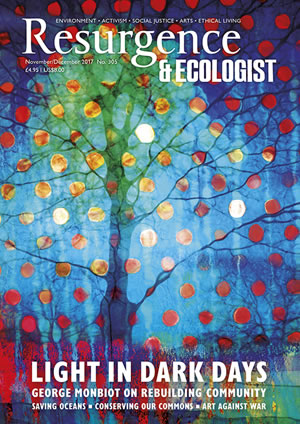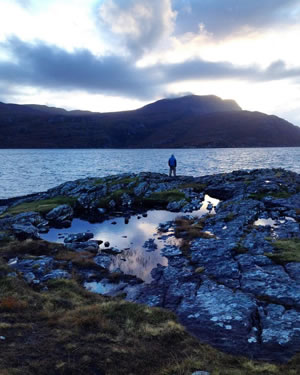We live in fractious, fragmented and yet bizarrely frivolous times – a reality that we may actually feel, at whatever conscious level, is at odds with our instinctive nature. That is, with who we really are. Indeed, emphatically, we may be sure that it is, as these times so often torment and plague our compassionate, committed and contented souls. Not to mention our inherent connection to this Earth that sustains us all.
So just how have we allowed things to become so divisive, turbulent and indeed precarious? And is it possible for us to realign our lives with who we truly are before we cause terminal damage to what, for many of us, is nothing less than a miracle of life?
To begin with, it is, of course, essential to experience and acknowledge – and not just have faith in – what our ultimate identities are beyond the superficial ones that this world has attached to us. As has been the case for so many people over so many generations, it is the original and principal reason we are here on this Earth – to realise our ultimate identities and then to give full expression to them.
Indeed, it is to embrace the essentially spiritual and therefore higher nature of them – whatever the gross manipulations and misconceptions we have endured to keep us away from them. This is due not only to the feverish and ultimately fear-driven demands of our own egos, but also to the relentless need to control us of those in power – including not just those in economic and political institutions, but tragically those in some religious institutions too.
All of which serves to highlight the contrasting characteristics of our spiritual identities and how they differ from these forces – in that they do not seek to control or enslave us, but rather to enlighten, liberate and empower us in such authentic ways that they resonate within us, pouring light on our eternal and unified souls; so much so, that we then feel assured and able to live in far more humble, selfless and crucially equitable ways.
Vitally, our very being determines our way of living – not our way of living the time we can devote to our sense of being.
In opposition to this, however, our competitive capitalist culture is not especially concerned with our deeper identities, but more in using us in particular ways for its own ends. It seeks to lock us, both faithlessly and anxiously, into a collective mindset that insists that perpetual lack or need is a ceaselessly desperate preoccupation, whether or not we truly are in need.
This culture ensures that we are badgered into buying and selling more and more on a daily basis to keep afloat what is an instinctively insatiable and therefore unstable system, not just with regard to how much we are told we must accumulate economically and materially in our own personal lives to the devastating cost of our brothers and sisters in the world – someone inevitably has to lose out, of course – but even with regard to the weapons of varying degrees of destruction that we are persuaded are required to preserve this way of existing for our individual nations. We have seemingly come to value these weapons of war far more than anything we choose to invest in in order to preserve this planet we rely on so intrinsically.
This is a particularly insane and tragic anomaly for our spiritual hearts to comprehend, let alone accept, especially as all this stockpiling seems to do is to take us further and further away from that which we feel most comfortable with – our innate inner peace and the harmony we would share with all.
Indeed, spirit and our focus on amassing appear to work in inverse proportion to each other. Ironically, the contentment we cherish so much is inevitably not being afforded by a never-ending cycle of perpetual striving and consumption that has increasingly become obsessive and alarmingly addictive. By contrast, the less grasping, sparing and shared way of life that is in tune with spirit may well just allow it to flourish.
This way of life allows us more contemplative time to explore, uncover and nurture a deeper meaning, purpose and, yes, even that vital sense of eternal security in our lives, particularly outside of our airless world of glass, bricks and mortar, where the enduring and harmonising cycles of Nature begin to flow interactively, irresistibly and relentlessly with our very souls. So much so, that the spiritual presence within us is awakened and then walks alongside us in all we say and do, with a voice that inspires and encourages us in empathetic directions that are to the long-term benefit of the whole of humankind and our Earth.
This is in line with the enlightened teachings of Saint Francis of Assisi and Mahatma Gandhi, of course, which today still demand that the needs of all should come way ahead of the wasteful greed of the individual: needs that, believe it or not, can still be met right across our world if only our perspectives are transformed.
It is not just the ideals and very natures of Francis and Gandhi but the way they lived their lives that we should urgently look to imitate. At no stage did they seek personal power or opulence, but rather their lives reflected a simplicity and frugality that have borne an enduring influence reverberating far beyond their particular eras.
Indeed, there is ample evidence to suggest that, far from feeling that they suffered or endured this lifestyle, they actually embraced it, by discovering an inner peace within it. They realised what many others of us have too: that there is an authenticity that echoes within all our souls when finally we climb down off the greasy pole that has always demanded more and more of us and our Earth’s diminishing resources, and express our inner surety and equanimity in selfless and radical actions and not just endless words.
Yet, in the end, is this not precisely just what so many of us are so frightened to do, however enlightened or unenlightened we may feel we have become – sacrificing the individual status and kudos of all that we may feel we have built up for the universal good of all? Until, that is, we discover that extraordinary peace of mind that comes with actually having less but being more.
It is no wonder that most of us are so frightened. Wherever we look in society today, including throughout so much of religion, there is very little discussion about having to alter our lifestyles drastically. Indeed, many of us who work in the environmental and human rights movements do not necessarily acknowledge and confront the radical action that is required, even though we know, perhaps more than many, that the time for talking is over.
Whichever way we look at it, whether in relation to the sovereignty of each person’s human rights across our world (that have been abused for so long), or to the sustainability of our planet, this accumulative and exploitative way of existing really has had its time. Our addiction to excess out of fear – for that is what it is – simply has to be overcome.
We have, as Francis and Gandhi did, to seek something far deeper by embracing and even in time revelling in the liberation of a simpler, more frugal, and – yes – spiritually deeper life. Not just for our very survival, but for the reawakening of our souls.
Saint Francis, the patron saint of ecology, knew all about this long ago. He knew that only by living a simpler, thriftier life could we possibly share it with all our brothers and sisters as well as the whole of Nature. As did the early believers in Christ after his ascension, reported in the Acts of the Apostles:
“All the believers were one in heart and mind. No one claimed that any of their possessions was their own, but they shared everything they had... [T]here were no needy persons among them. For from time to time those who owned lands or houses sold them, brought the money from the sales and put it at the apostles’ feet, and it was distributed to anyone who had need.” (Acts 4: 32–5, NIV).
How close to those ideals we must now live is a concern for all of us. But shift towards them we must. And sooner rather than later.







